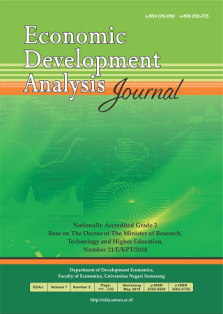Impact Shock Policy China Exchange Rate (Devaluation of Yuan) to Indonesian Economic Fluctuation
Abstract
The purpose of this study is to analyze the impact of yuan devaluation policy shocks on Indonesia’s economic fluctuations and the transmission of and the transmission of devaluation policy shocks which is more dominant on transmission mechanism of Mundell-Fleming-Dornbusch (MFD). The method used in this research is Structural Vector Error Correcction (SVEC). The results show that the China’s monetary expansion policy (devaluation of yuan) has a negative and positive impact (mixed effect)on Indonesia’s economics fluctuation, based on the transmission lines that’s affected. The response of macroeconomic variables to structural shock of monetary expansion policy of China (devaluation of yuan) based on model mechanism of MFD with Impulse Response Function (IRF) analysis from SVEC model shows that shocks of China’s current account balance, China’s exchange rate, and China’s imports is responded negatively (recession). While the shocks of China’s exports is responded positively (expansion). Based on the results of Forecast Error Variance Decomposition (FEVD) analysis, the current account transmission line is the dominant transmission to analyzing the impact of devaluation of yuan on the Indonesia’s economics fluctuation based on the MFD model through the expenditure switching effect, which is led to decline in Indonesia’s output (recession).


